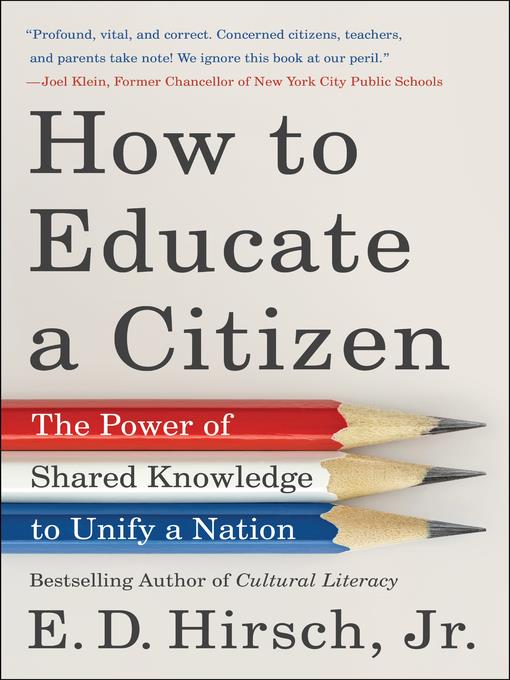
How to Educate a Citizen
The Power of Shared Knowledge to Unify a Nation
کتاب های مرتبط
- اطلاعات
- نقد و بررسی
- دیدگاه کاربران
نقد و بررسی

July 1, 2020
A prominent educator asserts that shared knowledge is crucial for national unity. More than 30 years after the publication of his controversial Cultural Literacy, Hirsch, now in his 90s, offers his "farewell book about American early schooling," which reprises his critique of fragmented, idiosyncratic curricula and insists on the importance of shared content. "Elevating rationality and natural science above emotional and religious sentiments," the author debunks what he calls the "educational romanticism" of thinkers such as John Dewey, who believed that teaching should be based on a child's interests rather than a teacher-created curriculum. This pedagogy, Hirsch maintains, has led to a dumbed-down, haphazard curriculum of "mush." Citing research from the National Academy of Sciences, among other sources, the author asserts that falling verbal test scores--and the nation's low rankings in reading, math, and science in relation to other developed countries--result from the misguided notion that critical thinking, problem solving, and reading comprehension are skills that can be taught apart from content. Here, the author quotes Swedish psychologist Anders Ericsson: "there is no such thing as developing a general skill." Hirsch's ideal curricula have three important criteria: coherence over time, ensuring that students build on a knowledge base; commonality of references and vocabulary to form an inclusive speech community in the classroom; and specificity of content. The author recounts his interviews with teachers and a school superintendent who express their dismay over contentless curricula and praise shared-knowledge schools, such as those adopting the curriculum that Hirsch created as founder of the Core Knowledge Foundation. In an afterword addressed to parents, the author offers "free downloadable materials" from the foundation. Anticipating critics who worry about "lockstep uniformity," Hirsch celebrates "unity in diversity" that can bind us "in civic duty toward the good of the whole." Americans' lack of civic engagement and ignorance of history, he argues, require nothing less than "an educational revolution." A fervent plea for reforming American schools.
COPYRIGHT(2020) Kirkus Reviews, ALL RIGHTS RESERVED.

July 13, 2020
Hirsch (The Making of Americans), founder of the education nonprofit Core Knowledge Foundation, delivers an impassioned yet myopic call for U.S. elementary schools to adopt a “shared-knowledge curriculum” as a means of improving student performance and healing hyperpartisanship. A “common stock of knowledge” based on “key concepts, historical figures, and events” and shared ideals such as “liberty, equality, and kindness” is the foundation for a competent and unified citizenry, according to Hirsch. He contends that the child-centered approach of contemporary educational theory, with its emphasis on “standards devoid of specific content” and general skills like critical thinking, has driven down America’s reading and math scores and led to the current divisive political climate. He cites data from the Lyles-Crouch Traditional Academy in Virginia and charter schools in the Bronx as evidence that a “shared-knowledge approach” raises test scores, narrows the achievement gap, and helps educators to achieve the “double goal of quality and equality.” Though he insists that “diversity is not inconsistent with national unity,” and presents some intriguing evidence to back his claims about student performance, Hirsch’s unwillingness to fully grapple with the question of whose knowledge best defines American history and culture weakens his argument. This well-intentioned treatise falls short. Agent: Marly Rusoff, Marly Rusoff & Assoc.

August 1, 2020
Education-policy thinker and provocateur Hirsch reignites the continuing debate over the content and value of contemporary elementary education in the United States. He claims to speak not so much as an educator but as an American, concerned about our survival as a high-achieving, fair, and literate society. This is a continuation and development of his controversial and bestselling 1987 book, Cultural Literacy: What Every American Needs to Know. In both volumes, Hirsch argues that without common cultural knowledge, imparted in the classroom, we are a nation at risk. He asserts that the progressive, child-centered approach to instruction, focused on tailoring instruction to the individual child and utilizing values-driven curricula, has diminished and diluted content-based instruction in such areas as history, civics, and geography. The result is a citizenry without a shared body of knowledge to ensure social cohesion, effective communication, full participation in civic life, and belief in the common good. Though this book does not offer a panacea for our troubled education system and deeply divided society, it is valuable for the ongoing education debate.(Reprinted with permission of Booklist, copyright 2020, American Library Association.)

























دیدگاه کاربران